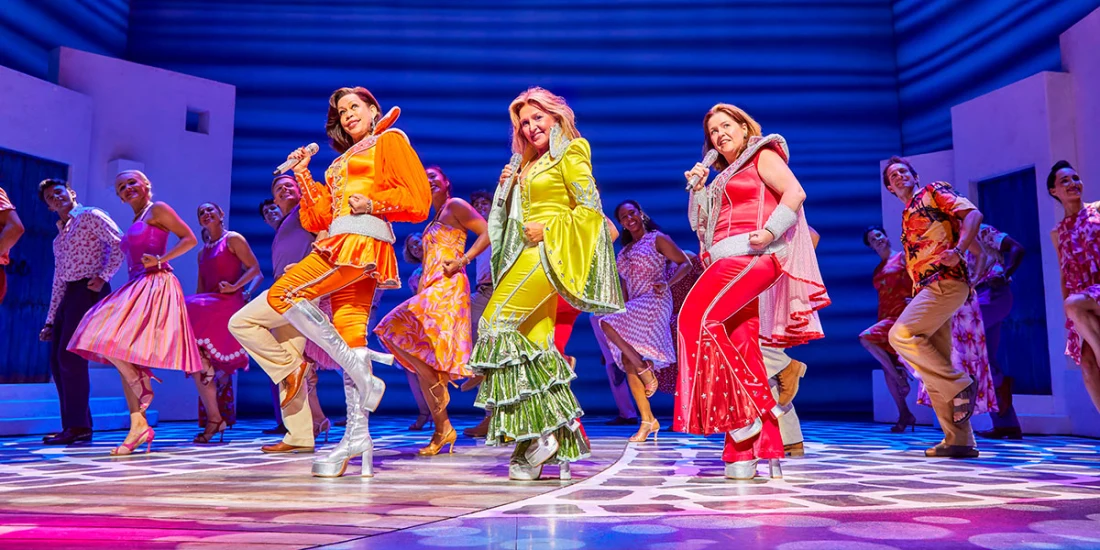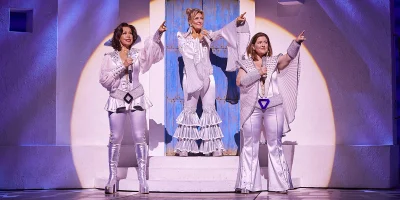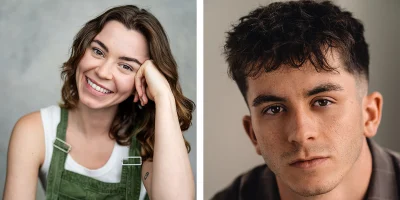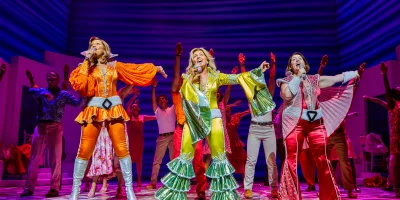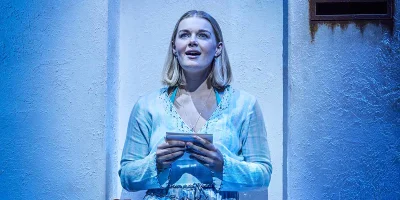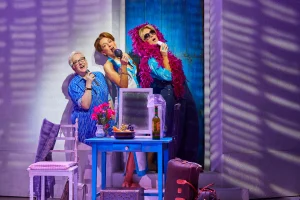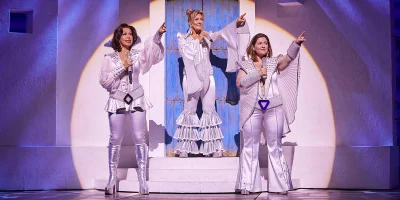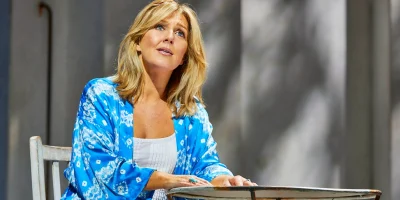
Mazz Murray, Josie Benson, and Gemma Goggin on creating Dynamo magic in ‘Mamma Mia!’
The stars of the ABBA musical share why it’s so special to portray strong women onstage and why this show has been captivating audiences for 23 years.
Mamma Mia! is about women supporting women. Despite involving a wedding, the ABBA-scored jukebox musical is a rare example of a story that is not about a woman’s quest to find a man. In fact, it’s really about three lifelong friends who get together to support each other, and that’s one of the many reasons audiences have flocked to Mamma Mia! for 23 years and counting at the Novello Theatre in London.
“We're also one of those rare shows that celebrates winners,” said Mazz Murray, who stars as Donna. “Most musicals lately are celebrating the underdog. Whereas, this is absolutely just saying: Look at these three women, aren't they great?”
They certainly are, and Murray is joined by Josie Benson as Tanya and Gemma Goggin as Rosie to complete the Dynamos. The trio started performing together when theatres were reopening in August, and eight months on, their friendship offstage is just as rich as their characters’ bond on stage. Speaking via Zoom, their chemistry is undeniable as they make each other laugh and finish each other’s sentences throughout.
“It’s nice having a friendship on the stage, where you get to play and have that quality, because generally with the show schedule and children, I don't get to see my actual mates outside the theatre,” Goggin said. “I’m the luckiest that I would choose to be around these two anyway. That's luck.”
The performers also take the message of the show to heart offstage as well and champion writer Judy Craymer’s mission to support women and ovarian cancer awareness. World Ovarian Cancer Day is 8 May, and the cast hopes that women who come to the show get checked.
“Judy Craymer is very instrumental in ovarian cancer awareness, and she incorporates all of that into everything that we do,” Murray said. “So when you've got that short window of women that are coming to a show, and then you just go, ‘By the way, don't forget to check yourselves.’ I think that's really admirable. That’s just another thing that she does, which is supporting women and women's health and welfare.”
London Theatre chatted with Murray, Benson, and Goggin about what it’s like to portray this iconic threesome onstage and why we need more shows about relationships between women.
Book Mamma Mia! tickets on London Theatre.
The three of you have such amazing chemistry onstage together. Did you know each other before joining the show?
Mazz: We met once at the audition.
What was that meeting like?
Gemma: Scary.
Mazz: I was already in the show, so it was probably very scary for them. It's really helpful that they do that because you see who you just naturally bounce off before the process starts. And so much of the relationship between the Dynamos is luck…and luckily, we all get on like a house on fire.
Did you hang out a lot when the show was in rehearsals to establish that?
Mazz: Well, we couldn't. It was right in the thick of lockdown. So everywhere was closed. We were masked for the first month, at least.
Josie: Yeah. That was a nightmare.
Mazz: So when all the masks came off, we didn't even know each other! It was extraordinary to start a show in those conditions. So considering, I think the West End has done incredibly well because it's so not conducive to what we have to do, let alone for forming relationships.
What was your relationship to Mamma Mia! before joining the show?
Josie: I'd auditioned for it I think a couple of times before. And similar to Mazz, when Mamma Mia! opened 23 years ago, I was also seen for Sophie. And then fast forward, I was seen a few times for Tanya, and it was always, “Oh wow, maybe one day.” So it was just a real dream come true. But I was never a massive ABBA fan, but I am now because I've grown to love the songs
Gemma: I auditioned for it in about 2004 for one of [Sophie’s] friends and didn't get past the first audition, which was probably best at that time. I wouldn't pass the dance call. And yeah, I auditioned for it about three years ago and got down to the last round, I didn't get it. Again, not a huge ABBA fan before getting the job, but love the show. They're special women, aren't they? So it feels like a nice gig to play, to have strong women. She's rare. Maybe it's getting less rare, I don't know.
Mazz: Maybe it's getting less rare. I think it's hard for men right now. [Laughter] I've always been a massive ABBA fan, and it's so remarkable. Sometimes I'm on stage and “Chiquitita” is playing and I'm hiding under a blanket. And I remember being 11 years old on my tree swing in my garden with my Walkman listening to “Chiquitita,” pretending that I was on stage in an arena singing it. It was such a part of my youth growing up.

Mamma Mia! Is a rare musical that centers on the relationships between women instead. Was it special for you, as actors, to get to work alongside your peers?
Mazz: It is, because it's something that the audiences can absolutely and totally identify with. You'd hope that everybody has a friend at least. If they don't have love in their life romantically, you'd hope that they share this bond that women especially have, and you feel it in the audience. Josie: And it's great as well for women of this age to have so much importance in a show through the years. Because I think often with musicals, well, traditional musicals, you get the much younger girl and her love interest. That's the highlight of the show.
Mazz: But what happened to the princess after she got married and had a baby?
Gemma: Frozen in time. Probably became a beast.
Mazz: Yeah. It hasn't quite got the same ring to it, has it? We're so lucky to be doing something that's so uplifting every day. I've always said if I was in something, God forgive me, but depressing like Les Misérables, I don't know if I could get the energy to do it every single day.
Josie: This is the first comedy role I've ever done, because I'm often in shows where I'm the downtrodden woman, or I have to sing the song where I cry and everything's really sad. And you never tire of this. You never ever do. It doesn't matter what mood you're in before you come in, by the end of the night, we're on such a high. Gemma and I run into our dressing room and we're buzzing at the end.
Gemma: Yeah. And then the G&T kicks in and we're like…
It sounds like you guys have a lot of fun when you're not on stage.
Mazz: It's definitely like a midnight version of this show. Well, that would be disastrous, wouldn't it? Honestly, it's very naughty.
Gemma: It's mostly you.
Mazz: It is mostly me. It is. These two are very, very professional, and I like to push the boundaries, let's say slightly.
Do you identify with your characters and the journey of these friendships?
Mazz: You have to be strong, to have survived in this industry as long as we have. So we have to have had the qualities that our characters have, tenacity and humor, to actually still be here. So we always have that common ground anyway, don't we, in relation to the show, for sure, because it's not easy. We're all parents, that's not easy to get through that stage. You enter No Man's Land when you have a baby in this industry, and you make that decision, and you are quite unsure about how quickly, or if indeed you are ever going to bounce back to being show fit and able to partake in shows. So I think for the three of us to have survived that,
Josie: It's wonderful because our dresser has also got children. And I have children, and my boys, they're 27. And we go ‘round in a circle discussing the different ages and the stages and what we go through. And I say, “Well, it never ends,” even though mine are men.
Mazz: We understand it, and also in a way, our priorities are not about us. When you are a parent, it's never really about you anymore. Your first thought and your first priority is your kids – damn them. And so we get these little magic few hours every night to put nice makeup on and costumes and play and enjoy each other and enjoy our lives, and it also keeps us better women, because we have those moments for ourselves.
Josie: What I get from Tanya, is this amazing sense of just because you're a certain age, it doesn't mean you can't still have fun. And the Dynamos, they go by and they relive that time when they were a group and you see what the audience gets from that. And I've learned a lot from Tanya. I really have. They're all great women. You want to be mates with them.
Gemma, do you identify with Rosie?
Gemma: She's super funny, Rosie. And I like to think that I'm reasonably funny. She's clearly lived. She is sort of who I would be if I'd not met my husband, because I'd still be out just doing whatever I wanted. But she's got a similar vibe to me, I guess, although she's more of a traveler. I think also you find the bits that remind you of the character and vice versa.
Mazz: I'm a little bit of all three, I think.
Well, you’ve played Tanya too.
Mazz: I did. But I think that the three Dynamos are part of everybody. I actually do. I can draw something from all three, but Donna is so utterly fulfilling to play. You only get one scene to show that you are happy right at the beginning. You only have a very small window to show the audience that you're not burdened with sadness, or troubled, I should say. But I love it. I love it. And we do it through music.
Mazz, you've made such a great curtain speech on the 23rd anniversary performance about the lasting impact of the show. Why do you think audiences keep coming back?
Gemma: In terms of a musical that’s been crafted around songs that already exist, it does that better than any others, and they fit quite seamlessly, and it brings absolute joy. Like when all the theaters reopened, people were really excited to be at the theatre, but you saw that every night. You see that joy. People will come and they will cry at some point, and they will laugh at some point. And I don't think that all shows do that.
Mazz: People that love ABBA know what they're going to get. So you are always going to get the ABBA audience. And then as the ABBA audience got older, Judy Craymer brilliantly developed a new medium of film that brought in an entirely new generation. Because when I was first in the show, although the movie had come out, it hadn't quite hit that age group of teenagers. So we weren't getting the audiences that say Wicked and Heathers and those audiences were getting, and we now are.
Because since the two films have come out, we now have three generations. So you're appealing to three different age groups, which is massive for shows. Normally you are being dragged along by your kid, or your kid is being dragged along by you. And then men actually end up liking it more than they think they would.
Josie: I think for me, the show gives optimism and restores your faith in love, and that's what we need.It's true. It sounds cheesy, but that's what it does. It restores people's optimism. And it reminds you of love. We need that in this day and age. It's food for the soul, man.
Frequently asked questions
What is Mamma Mia! about?
How can I resist you? This crowd-pleasing global smash began in London and continues to delight audiences around the world. The hit songs of ABBA tell the story of a bride-to-be who just wants to know who should walk her down the aisle. Join the party at Mamma Mia! at the Novello Theatre today.
How long is Mamma Mia!?
The running time of Mamma Mia! is 2hr 35min. Incl. 1 interval.
Where is Mamma Mia! playing?
Mamma Mia! is playing at Novello Theatre. The theatre is located at 5 Aldwych, London, WC2B 4LD.
What's the age requirement for Mamma Mia!?
The recommended age for Mamma Mia! is Ages 5+. Under 16s must be accompanied by and sat next to an adult (18+). If children do have separate seats you may be refused entry. All persons entering the theatre must have a ticket. Children under 3 will not be admitted..
How do you book tickets for Mamma Mia!?
Book tickets for Mamma Mia! on London Theatre.
What are the songs in 'Mamma Mia!'?
All the songs included in Mamma Mia! are hits from the iconic band ABBA. The musical includes songs like “Dancing Queen,” “Thank You For the Music,” and “Money, Money Money.” Read our song guide to all the ABBA songs in Mamma Mia.
Who wrote 'Mamma Mia!'?
Mamma Mia! was written by playwright Catherine Johnson. The show is a jukebox musical which includes songs from the Swedish pop group ABBA.
Who directed 'Mamma Mia!'?
Mamma Mia! is directed by Phyllida Lloyd (The Iron Lady, Tina: The Tina Turner Musical), who also directed the film adaptation for which she received BAFTA and Golden Globe nominations.
When did 'Mamma Mia!' open in the West End?
Mamma Mia! has been playing at the Novello Theatre since November 2014. The show opened at the Prince Edward Theatre on 6 April 1999 and later transferred to the Prince of Wales Theatre on 9 June 2004.
Is 'Mamma Mia!' appropriate for kids?
People of all ages can enjoy Mamma Mia!. An adult must accompany any children under the age of 16. Children under the age of 3 will not be permitted into the auditorium.
Is 'Mamma Mia' good?
Mamma Mia! is the ultimate feel-good musical for the whole family to enjoy, featuring many hits from ABBA’s timeless discography. Read our four-star review of Mamma Mia!.
Which ABBA songs are in 'Mamma Mia!'?
Some of ABBA’s greatest hits are included in Mamma Mia!, including "Dancing Queen," "The Winner Takes It All," and "Waterloo," and many more. In total, there are 24 ABBA songs included in the show.
Who is Sophie's dad in 'Mamma Mia!'?
In the musical Mamma Mia!, Sophie's dad is one of three potential men: Sam Carmichael, Bill Austin, or Harry Bright. Sophie's journey to uncover her father's identity drives the plot, as she invites all three men to her wedding in a quest for the truth.
Where is 'Mamma Mia!' set?
The musical Mamma Mia! takes place on an idyllic Greek Island in the Aegean Sea. The movie was filmed on location on the Greek Islands, including Skopelos.
Originally published on
